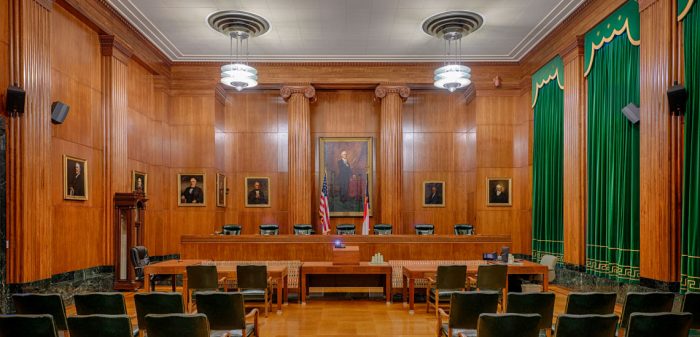A historic win for democracy in North Carolina
State Supreme Court checks attempts by gerrymandered legislature to change NC constitution
In a groundbreaking ruling, the North Carolina Supreme Court held that the North Carolina Constitution imposes limits on a racially gerrymandered legislature’s authority to initiate the process of amending the state constitution. The court sent the matter back to the trial court for further fact-finding with clear guidance.
SELC and Forward Justice represented the North Carolina NAACP in challenging the legislature’s power grab.
The court agreed with our client that this case posed an extraordinary circumstance of legislative overreach. As the ruling stated:
“What is extraordinary about these events is not that a legislative body was composed in part of legislators elected from unconstitutional districts. That has occurred on numerous occasions in recent years just in North Carolina alone…. Rather, what makes this case so unique is that the General Assembly, acting with the knowledge that twenty-eight of its districts were unconstitutionally racially gerrymandered and that more than two thirds of all legislative districts needed to be redrawn to achieve compliance with the Equal Protection Clause, chose to initiate the process of amending the state constitution at the last possible moment prior to the first opportunity North Carolinians had to elect representatives from presumptively constitutional legislative districts.”
This case began in 2018, when the North Carolina NAACP challenged two constitutional amendment questions placed on state ballots – one imposing a photo ID requirement to vote and one lowering the state income tax cap – on the grounds that the North Carolina legislature was only able to achieve the constitutionally required supermajority needed to change the state constitution by relying on racially gerrymander representation.
Today we stand proud in checking the legislature’s illegal and racist attempt to entrench its illegitimate power.
Senior Attorney Kym Meyer
In 2017, the districts were deemed not only unconstitutional, but also one of the largest racial gerrymanders ever encountered by a federal court. However, before elections in the updated districts took place, state legislators rushed to use their unconstitutional power to place amendments on the ballot to change the state’s constitution. Without the illegal racial gerrymandering, the legislature could not have met the constitutionally-required threshold to propose any of these constitutional amendments.
North Carolina NAACP President Deborah Maxwell explained,
“Today’s decision sends a watershed message in favor of accountability and North Carolina democracy. Rigging elections by trampling on the rights of Black voters has consequences. No legislature has the right to use racially gerrymandered maps—infecting more than two-thirds of the districts of this state—to steal power from the people to change our state’s constitution. The N.C. NAACP was proud in 2018 to stand up against this widespread abuse by the North Carolina legislature, and we are proud today to have prevailed in our fight to protect the sanctity of the North Carolina Constitution. We vow to continue Forward Together, Not One Step Back in our fight for the rights of the people.”

The state Supreme Court ruling, after reversing the decision of the Court of Appeals, directed the trial court to consider three additional questions in light of the highest court’s clear guidance: “whether there was a substantial risk that each challenged constitutional amendment would
(1) immunize legislators elected due to unconstitutional racial gerrymandering from democratic accountability going forward;
(2) perpetuate the continued exclusion of a category of voters from the democratic process; or
(3) constitute intentional discrimination against the same category of voters discriminated against in the reapportionment process that resulted in the unconstitutionally gerrymandered districts.”
Senior Attorney Kym Meyer explained:

“The court’s ruling is an historic win for democracy and the people of North Carolina. North Carolina’s Constitution can be amended only by the will of the people. A supermajority engineered through an unconstitutional racial gerrymander does not have unlimited authority to alter the constitution. As it has throughout its history, the NAACP stood up where it saw injustice, and today we stand proud in checking the legislature’s illegal and racist attempt to entrench its illegitimate power. Once again, we see how important North Carolina’s courts are in protecting our democracy when our legislators violate the constitution.”
“Today’s ruling is the perfect illustration of how the concept of checks and balances in our democracy is supposed to work,” added Caitlin Swain, Co-Director of Forward Justice. “This historic decision, protecting the cornerstone promise of our democracy, is the result of the kind of careful judgment that North Carolinians deserve from our judiciary. In North Carolina, constitutional officers are elected representatives charged with upholding their oath to the constitution and protecting our fundamental rights. The N.C. Supreme Court’s decision today gives our clients and the people of this state renewed hope that their fight for a representative democracy, equal justice, and accountability–however long the road– is not in vain.”
In 2019, a Wake County Superior Court judge ruled for the North Carolina NAACP and declared the amendments void. That ruling was overturned in a two-to-one decision of the North Carolina Court of Appeals, which brought the matter to the Supreme Court. A timeline of the case to date can be found here, and a brief timeline outlining recent challenges to North Carolina’s discriminatory photo voter ID laws can be found here.
This ruling comes after the North Carolina Supreme Court held earlier this year that the state General Assembly once again engaged in unconstitutional redistricting in 2021.
